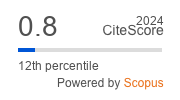Method for calculating a thermal expansion induced mechanical stress in three-dimensional solid-state structures using mathematical modeling
https://doi.org/10.17073/1609-3577j.met202307.483
EDN: SMVTJB
Abstract
At the end of the 20th century, the demand for more efficient methods for solving large sparse unstructured linear systems of equations increased dramatically. Classical single-level methods had already reached their limits, and new hierarchical algorithms had to be developed to provide efficient solutions to even larger problems. Efficient numerical solution of large systems of discrete elliptic PDEs requires hierarchical algorithms that provide a fast reduction of both shortwave and longwave components in the error vector expansion. The breakthrough, and certainly one of the most important advances of the last three decades, was due to the multigrid principle. Any appropriate method works with a grid hierarchy specified a priori by coarsening a given sampling grid in a geometrically natural way (a "geometric" multigrid method). However, defining a natural hierarchy can become very difficult for very complex, unstructured meshes, if possible at all. The article proposes an algorithm for calculating the deformation that occurs under the action of a thermal expansion force in three-dimensional solid models based on a grid approximation of the problem by hexagonal 8-node cells. The operation of the algorithm is illustrated by solving three problems.
About the Authors
K. A. IvanovRussian Federation
27 Okruzhnoy Passage, Moscow 105187
Kirill A. Ivanov — Electronics Engineer, 1st Category
E. V. Kaevitser
Russian Federation
27 Okruzhnoy Passage, Moscow 105187;
4-1 Leninsky Ave., Moscow 119049
Ekaterina V. Kaevitser — Head of the Laboratory for Advanced Scientific Research (1); Associate Professor, Department of Physics (2)
A. A. Zolotarev
Russian Federation
78 Vernadsky Ave, Moscow 119454
Alexey A. Zolotarev — Associate Professor of the Department of Nanoelectronics
References
1. Certificate of registration of the computer program (Ru) No. 2019614711. Zolotarev A.A., Ivanov K.A. The program for calculating the stress-strain state of a metal matrix composite ([aliceflowv0_32]). Appl.: 04.02.2019, reg.: 04.10.2019. (In Russ.)
2. Lin C.H., Huang P.S., Tsai M.Y., Wu C.T., Hu S.C. Mechanical design and analysis of direct plated copper film on AlN substrates for thermal reliability in high power module applications. Inter. conf. on electronics packaging and iMAPS All Asia Conference (ICEP-IAAC). Kyoto, Japan; 2015. P. 185–188. https://doi.org/10.1109/ICEP-IAAC.2015.7111025.10.1109/ICEP-IAAC.2015.7111025
3. Specifications (TU) 23.43.10-003-34576770–2017. Ceramic substrates VK96-DN (Al2O3 content not less than 96%). (In Russ.)
4. Prilutskiy A.A., Sidorchuk E.A., Petrov A.S. Modeling of aperture mechanical deformation influence on array factor of space-based active phase ARRAY antenna. Vestnik NPO im. S.A. Lavochkina. 2017; (4(38)): 160–170. (In Russ.)
5. Timoshenko S. Strength of materials. In 2 vol. Vol. 1. Elementary theory and problems.Princeton a. o., Van Nostrand; 1965. 360 p. (Russ. Transl.: Soprotivlenie materialov. In 2 vol. Vol. 1. Elementarnaya teoriya i zadachi. Moscow: Fizmatgiz; 1965. 360 p.)
6. Landau L.D., Lifshitz E.M. Theory of elasticity. In 10 vol. Vol 7. Elasticities Landau, Lifshitz Moscow: Fizmatlit; 2003. 264 p. (In Russ.)
7. Sidorov V.N., Vershinin V.V. Finite element method in the calculation of structures: theory, algorithm, examples of calculations in the SIMULIA Abaqus software package. Moscow: АСВ; 2015. 288 p. (In Russ.)
8. Zolotarev A.A., Ivanov K.A. Analysis of the deformation of a housing made of a metal-matrix AlSiC composite during self-heating of a high-power field-effect transistor with a Schottky barrier. Elektronnaya tekhnika. Seriya 2. Poluprovodnikovye pribory. 2017; (2(245)): 39–47. (In Russ.)
9. Segerlind L.J. Applied finite element analysis. New York etc., 1976. 392 p. (Russ. Transl.: Segerlind L.J. Primenenie metoda konechnykh elementov. Moscow: Mir; 1979. 392 p.)
10. Brandt A., McCormick S.F., Ruge J.W Algebraic multigrid (AMG) for sparse matrix equations. Cambridge; Cambridge University Press; 1984. 284 p.
11. De Sterck H., Yang U.M., Heys J.J. Reducing complexity in parallel algebraic multigrid preconditioners. SIAM Journal on Matrix Analysis and Applications. 2006; 27(4): 1019–1039. https://doi.org/10.1137/040615729
12. De Sterck. H., Falgout R.D., Nolting J.,Yang U.M. Distance-two interpolation for parallel algebraic multigrid, submitted to numerical linear algebra with application. Technical report UCRL-JRNL-230844. May 10, 2007; 2007. 24 p.
13. Henson V.E., Yang U.M. BoomerAMG: a parallel algebraic multigrid solver and preconditioner. Applied Numerical Mathematics. 2002;41:155–177.
14. Ruge J.W., Stueben K. Algebraic multigrid (AMG). In: McCormick S.F. (ed.) Multigrid methods. Vol. 3. Frontiers in applied mathematics. Philadelphia: SIAM; 1987. P. 73–130. https://doi.org/10.1137/1.9781611971057.ch4
15. Segal M., Akeley K. The OpenGLTM graphics system: A specification (Version 1.0). 1994. 163 p. https://www.cs.uaf.edu/2006/fall/cs381/ref/opengl_1.4.pdf
16. Rogers D.F. Procedural elements for computer graphics. N.Y.: McGraw-Hill; 1985. 503 p. (Russ. Transl.: Rogers D.F. Algoritmicheskie osnovy mashinnoi grafiki. Moscow: Mir; 1989. 503 p.)
17. Demidov D. AMGCL: An efficient, flexible, and extensible algebraic multigrid implementation. Lobachevskii Journal of Mathematics. 2019; 40(5): 535–546. https://doi.org/10.1134/S1995080219050056
18. Zhukov V.T., Novikova N.D., Feodoritova O.B. Chebyshev iterations with adaptive refinement of the lower bound of the matrix spectrum. Moscow: IPM im. M. V. Keldysha RAN; 2018. 32 p. (In Russ.)
Review
For citations:
Ivanov K.A., Kaevitser E.V., Zolotarev A.A. Method for calculating a thermal expansion induced mechanical stress in three-dimensional solid-state structures using mathematical modeling. Izvestiya Vysshikh Uchebnykh Zavedenii. Materialy Elektronnoi Tekhniki = Materials of Electronics Engineering. 2023;26(4):309-319. (In Russ.) https://doi.org/10.17073/1609-3577j.met202307.483. EDN: SMVTJB





































